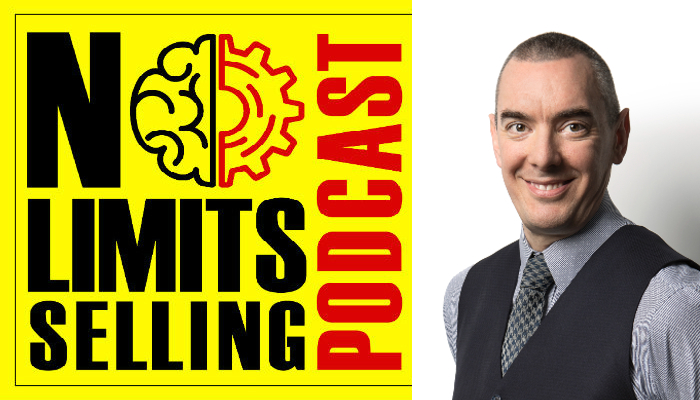What is Being “Better Than Zero” in Sales by Hamish Knox
On Episode 135 of The No Limits Selling Podcast, we have Hamish Knox, a member of the global Sandler network, Hamish supports private organizations in Southern Alberta create and maintain a scalable, repeatable, consistent sales engines and an engaged, motivated team by holding them accountable to implementing the structures, systems and processes shared in our sessions.
Hamish worked in a variety of industries including media, communication services, software and professional sports before joining the Sandler network, which melded his passions for sales and education.
Hamish was named the 2020 David H. Sandler Award winner, Sandler’s highest honor, becoming the first Canadian trainer to receive that award. He was the first two time author in the Sandler network, writing books on topics no one likes to talk about. His first book was on Accountability the Sandler Way and his second on Change the Sandler Way. Hamish is regularly invited by Sandler Home Office to speak at Sandler’s train-the-trainer conferences and Sandler’s public Sales and Leadership Summit in Orlando.
Committed to giving back so other entrepreneurs can enjoy the same opportunities he had when he launched his business, Hamish is an active mentor with Futurpreneur Canada, is a Maple Leaf Club donor to Enactus Canada and is a volunteer judge for regional and national student entrepreneur competitions.

Contact Hamish:
[EDITOR’S NOTE: This podcast is sponsored by No Limits Selling. It is a fun, fast-paced podcast that delivers hard-fought business advice that you can implement today to improve your sales and performance]
Interested In Our Real Estate Coaching Services? Explore Our Website: Link
Feeling Not Well Today? You Can Use Our Mindset Boosters App To amp Up Your Mood: Link
Find us on Social Media:
LinkedIn | Facebook community | Instagram
Like what do you listen to? Subscribe to our podcast!
Ready to become fearless? We can help you become fearless in 60 days so you accomplish more in your career Schedule A 15 min Call with Umar
Summary
Introduction and Background
The podcast features Hamish Knox, an esteemed author and the president of Sandler in Calgary, Canada. Knox is recognized for his transformative work with clients, altering their attitudes, behaviors, and techniques to improve their business performance. He has also penned two books, "Change the Sandler Way" and "Accountability the Sandler Way", which delve into his philosophies and strategies.
The Importance of Accountability in Business
In the podcast, Knox discusses the significance of accountability in business. He asserts that accountability is not a one-off event but a culture that should be ingrained within an organization. This culture of accountability is crucial in driving business success as it encourages individuals to take responsibility for their actions and decisions, thereby fostering a sense of ownership and commitment toward the organization's goals.
The Role of Leadership in Fostering Accountability
Knox emphasizes the critical role of leaders in cultivating this culture of accountability. Leaders are responsible for setting clear expectations and establishing the consequences of not meeting these expectations. By doing so, they create an environment where individuals understand their roles, responsibilities, and the impact of their actions on the organization's overall performance.
The Use of Key Performance Indicators (KPIs)
The podcast also highlights the use of Key Performance Indicators (KPIs) as an effective means of measuring accountability. KPIs provide a quantifiable measure of performance, allowing organizations to track progress, identify areas of improvement, and hold individuals accountable for their performance.
Conclusion: The Power of Accountability
In the podcast, Hamish Knox, a renowned author and business leader, underscores the crucial role of accountability in driving business success. He emphasizes that accountability is not a one-time event but a culture that needs to be nurtured within an organization. Knox highlights the pivotal role of leaders in fostering this culture by setting clear expectations and consequences. He also advocates for the use of Key Performance Indicators (KPIs) as a tool for measuring accountability.
In essence, Knox's philosophy centers around the idea that accountability is about creating an environment of ownership and empowerment, which can lead to improved performance, increased commitment, and the achievement of organizational goals.
Questions & Answers
Who is Hamish Knox?
What are the key topics discussed in Hamish Knox's podcast?
What does Hamish Knox mean by 'accountability is a culture'?
How can leaders foster a culture of accountability according to Hamish Knox?
Why are Key Performance Indicators (KPIs) important in measuring accountability?
What is the main takeaway from Hamish Knox's podcast?
Don’t miss this opportunity to transform your real estate career with one-on-one coaching. As an experienced real estate coach, I, Umar Hameed, am dedicated to helping you unlock your full potential and achieve your real estate goals. To learn more about who am I and my clients ↓
If you’re ready to take the next step, book an appointment with me today and begin your journey toward success in the real estate industry.
